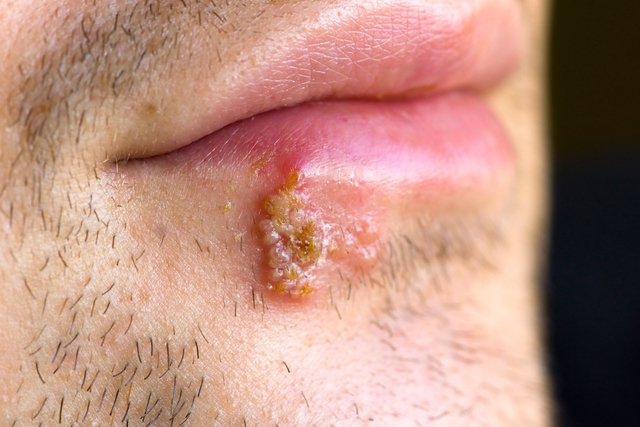Herpetic stomatitis generates sores that burn and cause discomfort, with red edges and a whitish or yellowish center, which are normally on the outside of the lips, but can also be on the gums, tongue, throat and inside of the cheek, taking an average of 7 to 10 days until complete healing.
This type of stomatitis is caused by the herpes simplex virus, also called HSV-1 and rarely caused by the HSV-2 type, and can cause symptoms such as inflammation, pain and swelling in the mouth, which normally appear after the first contact with the virus.
Because it is a virus that, after the first contact, settles in the cells of the face, herpetic stomatitis has no cure, and can return whenever immunity suffers a decline, as happens in cases of stress or poor diet, but it can be avoided. through healthy eating, physical exercise and relaxation techniques.
Sensitive content
This image may contain content that is uncomfortable for some people.

Main symptoms
The main symptom of herpetic stomatitis is the wound, which can be anywhere in the mouth, however, before the wound appears, the person may experience the following symptoms:
- Redness of the gums;
- Mouth pain;
- Bleeding gums;
- Bad breath;
- General malaise;
- Irritability;
- Swelling and sensitivity in the mouth inside and out;
- Fever.
Furthermore, in cases where the wound is larger, difficulties in speaking, eating and loss of appetite may also arise due to the pain caused by the injury.
When this problem arises in babies it can cause discomfort, irritability, bad breath and fever, in addition to difficulty breastfeeding and sleeping. See what treatment should be like in cases of herpetic stomatitis in babies.
Even though it is a common problem, it is necessary to see a general practitioner to confirm if it really is herpes and start appropriate treatment.
How the treatment is carried out
Treatment for herpetic stomatitis lasts between 10 and 14 days and is carried out with antiviral medicines in tablets or ointments, such as acyclovir or penciclovir. In cases of severe pain, painkillers such as paracetamol and ibuprofen can be used.
To complete the treatment of herpetic stomatitis, propolis extract can also be used on the wound, as it will provide relief from pain and burning. See 6 more natural tips on how to treat herpetic stomatitis.
To avoid the discomfort of symptoms, it is also recommended that a more liquid or pasty diet be consumed, based on creams, soups, porridge and purees and that acidic foods, such as oranges and lemons, be avoided.
Nutritionist Tatiana Zanin gives tips on how food can speed up the herpes recovery process, as well as preventing it from appearing again:

Sign up for our newsletter and stay up to date with exclusive news
that can transform your routine!
Warning: Undefined array key "title" in /home/storelat/public_html/wp-content/plugins/link-whisper-premium/templates/frontend/related-posts.php on line 12
Warning: Undefined array key "title_tag" in /home/storelat/public_html/wp-content/plugins/link-whisper-premium/templates/frontend/related-posts.php on line 13




